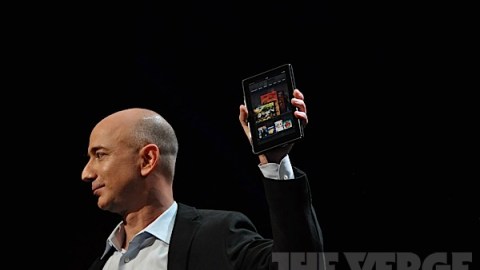Will Kindle set our Classrooms on Fire?

Yesterday’s launch of the new Amazon Kindle line-up was pretty impressive and has caused a stirr. Though Bloomberg apparently broke the embargo and published the news half an hour early. Doing so they either wanted to get the scoop or I am not the only one on the planet who has difficulties with the conversion in different time zones.
Anyway, almost everybody in the tech space acknowledges that this is a very bold move from Jeff Bezos. Jason Calacanis wrote an editorial at LAUNCH, referring to a post he published last week in which he stated that
“If Microsoft, Sony, Google, HP and Samsung want to make an impact in the tablet space, there is a very, very simple solution: lose money.
If I was running any of these companies, I would simply create a $99, $199 and $299 tablet and lose $10B getting 100M of them out there. Seriously, Apple will lower the cost of this overpriced device only when some maniac enters the market with a stunning price.”
And of course a first estimation on how much Amazon would be losing on every sale of the Kindle Fire came up pretty quickly
According to Piper Jaffray analyst Gene Munster, “Amazon is likely losing about $50 per Kindle Fire.”
$199 for a 7 inch tablet is a steal in itself and it makes all other Android based tablets seem so expensive. Looking at a 7 inch tablet with a price tag of $400 most people will ask themselves “Why?”. It might even have an impact on the price of the iPad, at least there is the possibility of a cheaper version similar to what Apple did with the 3GS when the iPhone 4 came out.
If you then add all Amazon features like movie and music streaming, Prime delivery, cloud storage and so on on top of it we can be pretty sure that the device will sell like sliced bread. Chris Ziegler wrote a very interesting editorial at This is my next in which he points out
And here’s the craziest part: on the strength of the entirety of the Amazon ecosystem — Kindle, Whispersync, and so on — the Kindle Fire will be the greatest and most popular Android-powered tablet ever created. By miles and miles and miles. And it’ll happen without Google’s blessing, without Andy Rubin’s blessing, without the Android Market.
Now, what will be the implications for education? First of all, the Kindle Fire has the potential to surpass the adoption of the iPad in schools and universities pretty quickly. The device is significantly cheaper and it offers the core functions students need in terms of being the replacement of textbooks.
Which is, of course, strongly tied to the Kindle Textbook Rentals platform. With a Kindle Fire, students have immediate access to all books Amazon is offering. Students can also borrow books in over 10.000 libraries across the US and this number will also rise.
The new Amazon Ecosystem with its own app market place has enough potential to attract a significant amount of developers who just need to bring their Android application over. But other than the open Android marketplace which has not really taken off in terms of revenue compared to the iTunes store up to now, the Amazon marketplace is tied to the very convenient Amazon payment system which is pretty similar to iTunes. Also, Amazon is controlling the experience like Apple does in its walled garden, and therefore developers find more structure when working on applications for Amazon.
Taking all that in consideration, there is a huge potential for educational applications on the Amazon Fire. For me apps on the iOS platform have shown some of the most interesting innovations in education lately and though the Amazon Fire has no camera or microphone, there is still enough room to innovate on. Sometimes it’s even better to focus on one dimension which in the case of the Kindle Fire is clearly consumption.
Meanwhile, on the other side of the globe India is getting ready for the launch of the long awaited $35 tablet. Minister Kapil Sibal says that “This is not just a dream, it is a reality”. Welcome to the post PC era.
Picture: This is my next





